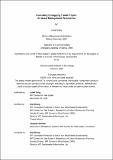Evaluating Chongqing Tiandi Project: An Asset Management Perspective
Author(s)
Yang, Junsi
DownloadThesis PDF (7.572Mb)
Advisor
Zheng, Siqi
Gordon, Jacques
Terms of use
Metadata
Show full item recordAbstract
This thesis uses the Chongqing Tiandi project as a case study to analyze the entire process of development and asset management for large-scale urban renewal projects in China's second-tier cities. It focuses on the motivations and outcomes of Shui On Land's transition from an asset-heavy to an asset-light model. Based on theoretical analysis (Chapter 2), corporate-level financial analysis (Chapter 3), and project-level in-depth studies and interviews (Chapter 4), the thesis explores the logic and impact of this strategic transformation from multiple perspectives. The theoretical analysis summarizes real estate lifecycle management theory, portfolio theory, and corporate strategic transformation theory, providing a framework to examine Shui On Land's strategic decisions. The financial analysis reveals that, from 2015 to 2017, Shui On Land faced significant financial pressure with high debt ratios and cash flow constraints, necessitating systematic asset disposals. While the company disposed of multiple assets during this period, Chongqing Tiandi's 79.2% equity disposal was particularly strategic due to its position as a high-risk, low-return asset within the company's portfolio. The project-level analysis and interviews demonstrate that replicating successful development models from first-tier cities in second-tier markets faces unique challenges. In Chongqing Tiandi's case, these challenges manifested in multiple ways: limited residential price premiums due to local land supply policies, substantial investment requirements for super high-rise developments exceeding $1 billion, and persistently low office rental rates in the local market. These factors compromised the project's financial self-sustainability and made it particularly vulnerable in Shui On's portfolio, especially when compared to projects in other second-tier cities like Wuhan. The development and subsequent equity sale of Chongqing Tiandi not only provided essential financial support for Shui On Land but also reflected a strategic decision to divest from a project where market conditions created both immediate challenges and future uncertainties. This research provides valuable references for the development of large-scale projects in China's second-tier cities, emphasizing the need for developers to utilize funds efficiently, adapt flexibly to market changes, and focus on achieving long-term value. These insights hold significant implications for sustainable development in complex market environments.
Date issued
2025-02Department
Massachusetts Institute of Technology. Center for Real Estate. Program in Real Estate Development.Publisher
Massachusetts Institute of Technology